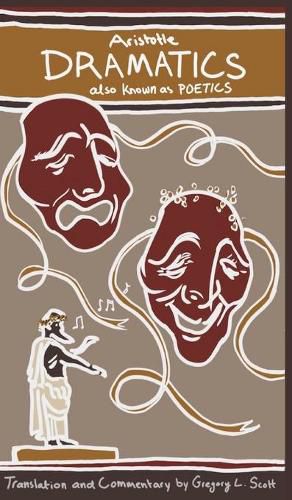Readings Newsletter
Become a Readings Member to make your shopping experience even easier.
Sign in or sign up for free!
You’re not far away from qualifying for FREE standard shipping within Australia
You’ve qualified for FREE standard shipping within Australia
The cart is loading…






This title is printed to order. This book may have been self-published. If so, we cannot guarantee the quality of the content. In the main most books will have gone through the editing process however some may not. We therefore suggest that you be aware of this before ordering this book. If in doubt check either the author or publisher’s details as we are unable to accept any returns unless they are faulty. Please contact us if you have any questions.
This is the first translation and commentary of Aristotle’s work that assumes the Northern Greek from Stagira employs the sense of poiesis given by Diotima in Plato’s Symposium, mousike kai metra ( music-dance and verse ), rather than the sense coined by the sophist Gorgias around 415 BCE, language in meter. Perennial problems–like why the treatise has not one poem and why the Stagirite never even mentions the purely literary genres in a work long known as the Poetics–therefore simply dissolve. Aristotle’s theory, which focusses on musical drama and which has music and dance in the definition of tragedy, concentrates on only three art forms: tragedy, comedy and epic (which is noted in its definition to be dramatic and which was performed by rhapsodes typically singing, with gestures that count as ordered body movement or dance for the Greeks).
Against a long-standing condemnation of Aristotle’s exclusively literary and textual bias, Scott’s interpretation reveals the Northern Greek to be much more sensitive to music, dance and other issues of performance of contemporary concern in the study of drama.
The translation is an emendation of one of the most renowned versions of the 20th century, by Ingram Bywater (1920), and corrects the seven core Greek terms, along with the 10 chapters (of 26), that have been misunderstood for generations. It takes advantage of the acclaimed Greek text by L. Taran and D. Gutas (Editio Maior, 2012) that itself has no translation.
The rigorous arguments for Scott’s revolutionary approach are given in his previous publications by Cambridge and Oxford University presses (1999 and 2003 respectively) and especially in Aristotle on Dramatic Musical Composition: The Real Role of Literature, Catharsis, Music and Dance in the POETICS ( ADMC,
2016; 2nd ed., 2018).
$9.00 standard shipping within Australia
FREE standard shipping within Australia for orders over $100.00
Express & International shipping calculated at checkout
This title is printed to order. This book may have been self-published. If so, we cannot guarantee the quality of the content. In the main most books will have gone through the editing process however some may not. We therefore suggest that you be aware of this before ordering this book. If in doubt check either the author or publisher’s details as we are unable to accept any returns unless they are faulty. Please contact us if you have any questions.
This is the first translation and commentary of Aristotle’s work that assumes the Northern Greek from Stagira employs the sense of poiesis given by Diotima in Plato’s Symposium, mousike kai metra ( music-dance and verse ), rather than the sense coined by the sophist Gorgias around 415 BCE, language in meter. Perennial problems–like why the treatise has not one poem and why the Stagirite never even mentions the purely literary genres in a work long known as the Poetics–therefore simply dissolve. Aristotle’s theory, which focusses on musical drama and which has music and dance in the definition of tragedy, concentrates on only three art forms: tragedy, comedy and epic (which is noted in its definition to be dramatic and which was performed by rhapsodes typically singing, with gestures that count as ordered body movement or dance for the Greeks).
Against a long-standing condemnation of Aristotle’s exclusively literary and textual bias, Scott’s interpretation reveals the Northern Greek to be much more sensitive to music, dance and other issues of performance of contemporary concern in the study of drama.
The translation is an emendation of one of the most renowned versions of the 20th century, by Ingram Bywater (1920), and corrects the seven core Greek terms, along with the 10 chapters (of 26), that have been misunderstood for generations. It takes advantage of the acclaimed Greek text by L. Taran and D. Gutas (Editio Maior, 2012) that itself has no translation.
The rigorous arguments for Scott’s revolutionary approach are given in his previous publications by Cambridge and Oxford University presses (1999 and 2003 respectively) and especially in Aristotle on Dramatic Musical Composition: The Real Role of Literature, Catharsis, Music and Dance in the POETICS ( ADMC,
2016; 2nd ed., 2018).